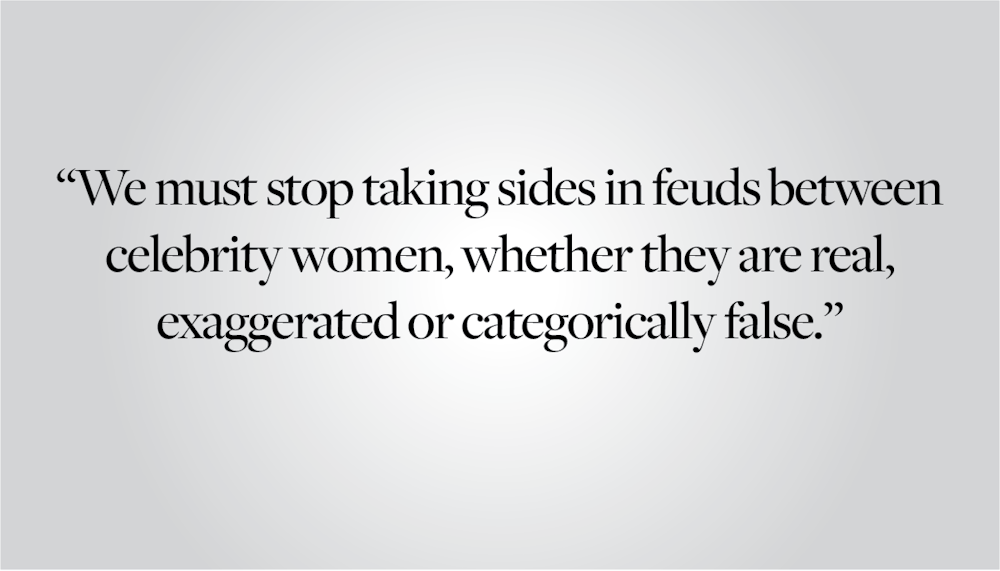Celebrity feuds go almost as far back as the modern celebrity persona itself. Some of the most popular feud narratives in tabloid media have been love triangles that see two women competing over a man. In Old Hollywood, it was Elizabeth Taylor and Debbie Reynolds. In the early 2000s, Jennifer Aniston and Angelina Jolie covered the front pages of tabloids. Most recently, a feud between Selena Gomez and Hailey Bieber has taken the internet by storm. Some of the women in question have openly addressed these feuds, while others have vehemently denied or refused to acknowledge the rumors. Whether or not there is any truth to these feuds, such narratives provide fodder for “catfights” and artificially-induced female competition, ultimately undermining feminism by reducing solidarity among women. We must stop taking sides in feuds between celebrity women, whether they are real, exaggerated or categorically false.
“Love triangle” narratives are among the most excruciatingly sexist in celebrity news coverage. The contrived pipeline of femme fatales “stealing” the husbands of America’s sweethearts is long and exhaustive. In each of the aforementioned cases, there is an established marriage or relationship between two celebrities that ends. The narrative goes that, presumably, the man has left the woman for another who is ostensibly more beautiful or in some way “better.”
Debbie Reynolds said that even she believed that her husband left her for Elizabeth Taylor because she wasn’t as “sexual” and “passionate” as Taylor. During Jennifer Aniston’s divorce, the press wrote that she had chosen a career over motherhood, which Brad Pitt couldn’t tolerate. And when Hailey and Justin Bieber married soon after the latter’s reported breakup with Selena Gomez, the narrative was that Hailey Bieber had “stolen” Gomez’s man. There’s one huge question that each case seems to avoid: What about the husbands? The fact that no one ever blamed Pitt for his divorce from Aniston seems to suggest that the public sees husbands as devoid of responsibility in these narratives. Instead, we blame women for either ruining their relationships or stealing each others’ partners. In all cases, public shaming abounds only for women. But what is truly shameful is that such narratives continue in our media today, even in a fourth-wave feminist society.
Though a frequent instigator, tabloid media alone can’t be blamed for this problem. These narratives have taken up page space across media for decades because of reader fascination. In the 2000s, “Team Aniston” and “Team Jolie” T-shirts demonstrated public buy-in for the presumed battle between the two. Even today, videos with #teamselena or #teamhailey hashtags cover TikTok’s “for you” pages. These videos take a clear stance on the feud, as in the case of the T-shirts, while also giving the public a chance to weigh in, providing their specific opinions on the relationships. Creating videos that further pit women against each other seems to provide spectators with their own twisted entertainment.
But what does this say about our culture? Why do we insist on proving that one woman is better than the other? We cannot justify this public endorsement of contrived strife between women. Yet this genre of gossip has titillated us enough so that celebrity feuds between women are staples of popular culture. Though it may seem far-fetched to completely undo our interest in celebrity culture, which would be a much more comprehensive answer to this problem, at the very least those who call themselves feminists must reconsider their relationship to these gossip campaigns.
Whether the celebrities are models, actresses, singers or none of the above, tabloid media coverage can’t get enough of women who may not get along with each other, especially when a man lies at the center of the conflict. As readers and consumers of media, it is our collective responsibility to actively resist these narratives and think critically about what they aim to accomplish. In a society where social media has become critical to celebrity discourse, it is even more vital that we reconsider what content related to these narratives we post, repost and even like. After all, we are only as good as the culture we perpetuate.





